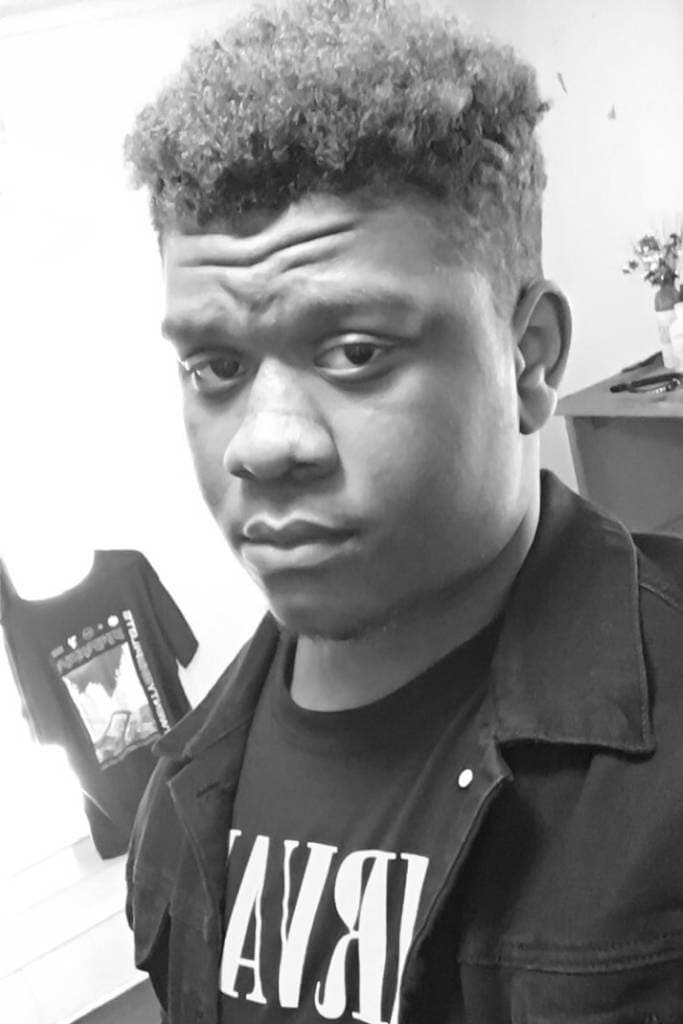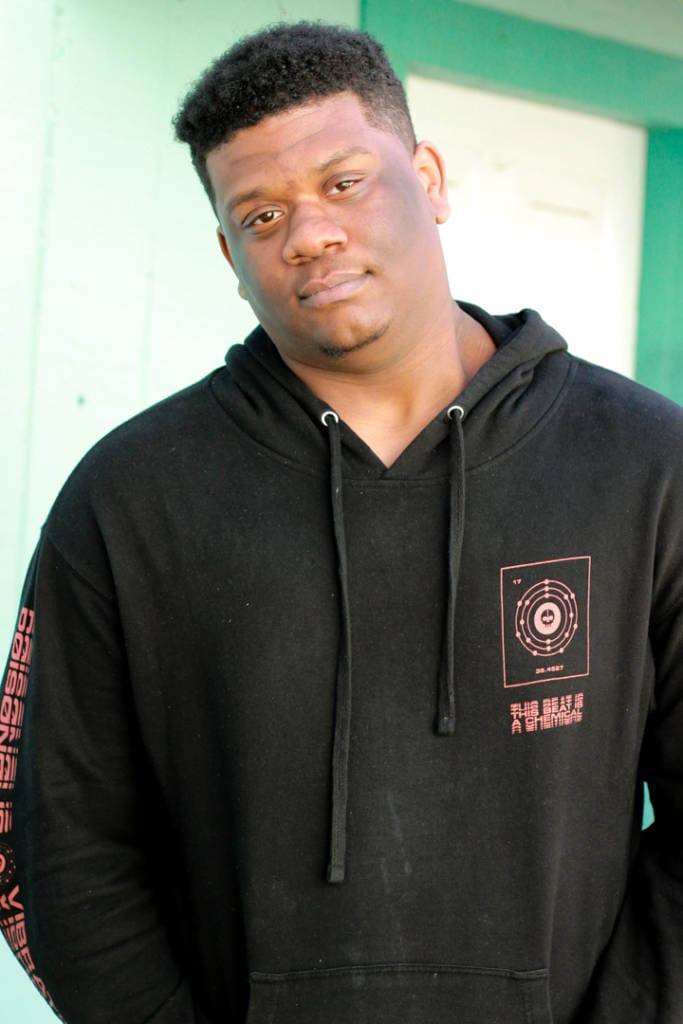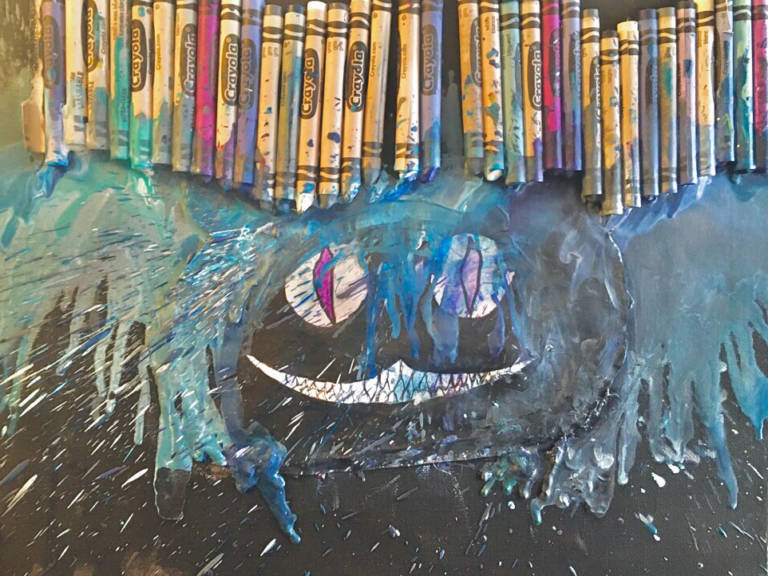Khyri Hobson is one of the most incredible 18-year-olds you’ll ever meet. Standing well over six feet tall, he could be intimidating if you didn’t take the time to get to know him. But when he speaks, he’s full of poetic words and deep thoughts and holds your eyes in a way that lets you know he’s really listening. He is respectful and serious, with a sweet smile that slips out if you tease him about just the right thing. He’s a treasure of a human being, and you can see that he’s fighting every day to believe it.
This past year, Khyri was a Senior at Parkland High School, who was able to return back there after being part of Crossnore’s Day Treatment Program on our Winston-Salem campus. Last fall he was referred to our program when dealing with severe depression and major attendance issues at his home school. Even when he was at school, Khyri admits that he wasn’t really present. “I didn’t feel like it was the place for me,” Khyri says, “I thought it was for people with anger issues and outbursts. And that’s not me. I felt displaced.”
A hard adjustment.
When students are part of our Day Treatment Program, they attend Kingswood Academy, where they benefit from small class sizes and have Crossnore Day Treatment Counselors in every classroom. Children receive regular therapy with a Crossnore therapist, and participate in small groups every day. In group, students work on emotional regulation, coping strategies, or life skills. Group allows students to talk about what they’re feeling and receive peer support. They meet to establish personal goals in the mornings and again in the afternoon to discuss that day’s successes and failures.
 It was a hard adjustment. Khyri readily admits that he was completely shut off. Coming from a very difficult home situation, Khyri had learned to default to a place of mistrust. His day treatment counselors, Ms. April and Ms. Angie, described him as withdrawn. He kept his head down and wouldn’t talk. He had no interest in participating and wouldn’t buy into any of it. When asked at daily check-in on the first day, how he was feeling, he was sad and depressed and described his rating as a negative two. When people tried to help him, his general response was, “Don’t waste your time.” “I’d lost hope in connection, in relationships,” he says. “I was so isolated.”
It was a hard adjustment. Khyri readily admits that he was completely shut off. Coming from a very difficult home situation, Khyri had learned to default to a place of mistrust. His day treatment counselors, Ms. April and Ms. Angie, described him as withdrawn. He kept his head down and wouldn’t talk. He had no interest in participating and wouldn’t buy into any of it. When asked at daily check-in on the first day, how he was feeling, he was sad and depressed and described his rating as a negative two. When people tried to help him, his general response was, “Don’t waste your time.” “I’d lost hope in connection, in relationships,” he says. “I was so isolated.”
Beginning to open up.
But gradually, Khyri began to open up. First, he would offer comfort and support to his fellow students in group. He’d lean into their problems, speak courage and hope into their situations, and give thoughtful advice. Ms. Angie says, “Khyri was awesome at listening. He took it all in and was super insightful.”He was determined too. Sometimes Khyri would have to walk to school. He might not make it until 11:30, and when he’d arrive, he’d be hot and sweaty, but he’d get there. As his attitude began to change, so did his desire to get to the place where he knew help was waiting.
Khyri had a hard time giving himself the same grace he was learning to give others, but he soon realized that there wasn’t as much of a difference between the other students and himself as he first suspected. “I was more like them than I thought,” he says. “I was destructive in a different way. I pushed everyone away.” It was that realization that shifted Khyri’s focus. He realized that Ms. Angie, Ms. April, his therapist, and so many others in the Day Treatment program truly did care about him.
Khyri first began advocating for his classmates and eventually started identifying and voicing his own needs. “I realized I wasn’t the only one,” Khyri says, “I grew close to those people. I would hear stories and give them hope. And then I talked myself into hope, too.” Eventually, he was not only fully participating in group, but asking to lead it as well. He lists off a long list of Day Treatment staff names, people who impacted him. “They were there for me,” he says quietly. “I miss them.”
Cracking a window.
Khyri recounts a walk he took one day, on campus, with Ms. Angie. She was talking about her relationship with God and a very tragic event she had to live through years before. “She couldn’t explain why God had let that happen.” But Angie had grown. She had hope. And Khyri realized that maybe she was someone who could understand him after all. “That’s when I cracked the window a bit,” he says. “I realized, ‘Maybe there is a God. And maybe He’s working.’” He was beginning to open up to the possibility that there might be some hope for him, too.
He says he’s learned not only how to put his feelings into words, but also coping strategies to help him when he’s down. Now, he takes walks, listens to music, and pulls the blinds to let the light in. He even stood up at his transition ceremony and spoke to the entire school. He talked about where he’d come from, how he’d changed, and encouraged the other students to do what it takes to create change for themselves. His Day Treatment counselors remember it fondly. He even threw away his “dark journal,” a journal full of dark poetry he had written, before he left. “I don’t need that anymore,” he had commented.
 Mr. Donald, Khyri’s Day Treatment Case Manager, says he was astounded by the change in Khyri. “It was drastic. This was a kid who was hopeless that became hopeful. He had a victim mentality. But by the time he left, he was a victor.” Khyri listened and internalized what he learned at Day Treatment. He realized that you can’t change the things that have happened to you, but you can decide to make things happen for you.
Mr. Donald, Khyri’s Day Treatment Case Manager, says he was astounded by the change in Khyri. “It was drastic. This was a kid who was hopeless that became hopeful. He had a victim mentality. But by the time he left, he was a victor.” Khyri listened and internalized what he learned at Day Treatment. He realized that you can’t change the things that have happened to you, but you can decide to make things happen for you.
Ms. Angie adds, “He went from utter darkness in spirit to a spirit of hope.” “He followed through with our suggestions and options,” says Ms. April. “He was determined to see things differently.” Kasshema Samuels, Crossnore’s Director of Day Treatment, says “Khyri’s story is exactly why I work in this field. I’m so thankful for the team of individuals who were committed to supporting him every day he was here AND to Khyri for never giving up on himself.”
New beginnings.
Khyri just finished his Senior year at Parkland. He made good grades, graduated, and has a job. He was blessed with compassionate teachers upon returning to Parkland and a has a few friends he feels like he can be real with. But life’s still not easy. He struggles and has to daily fight to believe he is worthy of hope and a future. But now, he’s in a better living situation and is able to express himself through art and poetry. He has the skills to deal with his negative emotions and can bring himself to a better place. “I see now that it is healthy to talk to someone. I value that now.”
Khyri plans to attend Forsyth Tech to complete his general education courses. He’s not sure what he wants to do in the future. “My heart is in the creative process. I want to do something I’m passionate about. If I don’t do something that makes me happy, I’m cheating myself.” He says he wants to help people, to make a difference. He says he could even see himself working in a Day Treatment program like Crossnore’s, helping kids like him. “I want to find my passion, to give back, to help.” Whatever he decides to do with his life, we know it will be amazing, and that he will help countless people in the future. Because Khyri is someone who has come from a hard place but has learned hope. And people who have walked through the fire and have learned to hope change the world.



